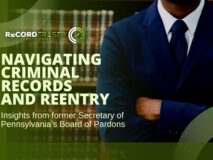
The legal system in Pennsylvania is constantly changing and evolving. The introduction of the new PA probation law, Clean Slate 3.0, is a significant milestone for individuals who want to start anew. If you have ever been tangled in the complexities of criminal records, you know the hurdles they present. But what if you could seal those records, making them invisible to landlords, employers, and the general public?
This new probation law could pave the way to a clearer future for you. Let’s dive into what this new probation law means for you and and how it could help.
Introduction to Record Sealing Under Clean Slate 3.0
Record sealing is a legal process that hides your criminal record from most people who try to access it. It differs from an expungement in PA and pardon, which erase minor offenses and non-convictions or forgive them, respectively. The Clean Slate 3.0 statute, passed in 2024, provides a new opportunity for individuals wishing to hide their past mistakes.
However, before applying for record sealing, knowing what is on your criminal history is essential. You can use tools like the Unified Judicial System (UJS) portal or request a full access review from the Pennsylvania State Police to help you in this process.
If your record does not appear on the UJS portal and cannot be found otherwise, it does not necessarily mean your record has been sealed; you just don’t know. However, we can help.
We can request a Full Access Review from the Pennsylvania State Police (PSP) for a flat rate fee of $100 for this service. This would have every PA record for which you were fingerprinted throughout your life.
To move forward with researching your record through the Pennsylvania State Police report, click here to fill out our form and let us know if you cannot locate your records.
The Path to Sealing Records – Understanding Your Options
To obtain a sealed record under Clean Slate 3.0, there are two different paths that one can follow. Each path is designed for specific types of offenses. Understanding the differences between these paths is important for anyone who wants to clear their criminal history. Here’s a breakdown:
Automatic Sealing:
- Definition: A process where eligible misdemeanors and simple drug felonies are sealed from public view without the need for an individual application.
- Eligibility: Applies to single misdemeanors and simple drug-related felonies.
- Timeline: Records are automatically sealed after a waiting period—seven years for misdemeanors and ten years for simple drug felonies.
- Benefits: Removes the burden of navigating the legal system for eligible offenses, making it a more straightforward path to sealing records.
Petition-Based Sealing:
- Definition: A more involved process requiring individuals to submit a detailed application to the court, explaining why their record should be sealed. This route is necessary for offenses that do not qualify for automatic sealing.
- Eligibility: Designed for cases that fall outside the criteria for automatic sealing, including certain misdemeanors and felonies not covered by the automatic process.
- Process: Involves compiling and submitting a petition that outlines the case for sealing, often necessitating the support of a legal professional to ensure success.
- Benefits: Offers a pathway to sealing for those with more complex records, though it requires more effort and legal assistance.
It is important to note that not all criminal offenses are eligible for automatic sealing, and it can be challenging to navigate the petition-based process. The distinction between these two paths is crucial. The petition-based route provides an alternative for people whose offenses don’t fit into the automatic sealing categories, but it often requires legal guidance to navigate successfully.
Navigating Challenges and Leveraging Opportunities
The journey to seal a record under Pennsylvania’s, Clean Slate 3.0, presents a myriad of challenges and opportunities. While the law opens new doors for many, understanding its complexities and preparing for potential hurdles is crucial. Here’s a deeper dive into how to navigate this process successfully:
Understanding Statute Complexity
Clean Slate 3.0 introduces nuanced criteria for automatic and petition-based sealing, making a thorough comprehension of its provisions essential. The law distinguishes between misdemeanors and felonies and stipulates specific waiting periods before eligibility for sealing can be met.
For misdemeanors, the waiting period is seven years, and for certain felonies, it is ten years. However, disqualifying offenses and other nuances can affect eligibility, highlighting the significance of a comprehensive review of one’s criminal record and the requirements of the new law.
Overcoming Opposition
Obtaining a petition-based sealing order can be challenging when facing opposition from the district attorney, particularly when there are concerns about the nature of the offense or the timing of the sealing request.
A hearing will be scheduled if the district attorney opposes the petition, allowing both sides to present their case. It is incredibly important to have a well-prepared petition and legal representation to navigate these challenges.
Financial Considerations
The cost of sealing records can vary, generally falling between $500 to $1500. This cost accounts for legal services in preparing and filing a petition and any additional fees if a hearing is required.
While this might seem daunting, it’s an investment towards clearing one’s name and opening up future opportunities previously hindered by a criminal record.
Leveraging The Benefits of Sealing
Despite these challenges, the benefits of pursuing record sealing under Clean Slate 3.0 are significant. Sealed records enhance job prospects, privacy, and overall peace of mind. They can remove barriers to housing and professional licensing, allowing individuals to move forward without the weight of their past actions holding them back.
Taking the Next Steps
If you’re uncertain whether your record has been sealed or if you’re eligible for sealing, start with a UJS portal search or click here and let us know in the form that you would like to move forward with requesting your PSP report for a flat rate $100 fee for service.
Once payment is received, we will request additional information to be included in the official request. The PSP usually responds with your record within 2-4 months and will reveal what was hidden from your public record. From there, we can move forward with a quoted fee to remove the charge by Pardon or Expungement.
These steps can clarify your situation and set the stage for your next moves. Remember, even sealed records can benefit from a pardon in Pennsylvania, making sure your past doesn’t shadow your future.
Feeling overwhelmed? You’re not alone. At Record Eraser, we’re dedicated to helping individuals like you navigate the complexities of expunging, pardoning, and sealing criminal records. Whether you’re looking for guidance on Clean Slate 3.0 or seeking professional assistance with your petition, we’re here to help.
Ready to take the first step towards a cleaner slate? Click here to learn more about Record Expungement, Clearing, Removal, and Sealing Services and how we can assist you in transforming your future. Don’t let your past define you—let’s work together to seal it away.




